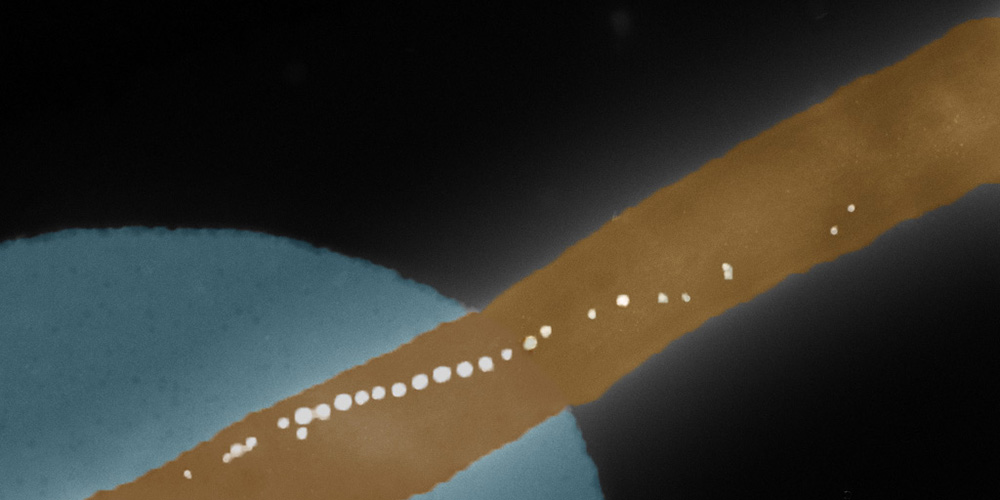“We want to make sure that nanomedicine can advance more rapidly.”
Nanomedicine involves packaging drugs in microscopic particles to make them more effective. Nanopharmacy professor Scott McNeil explains the opportunities presented by the new technology and what is still holding it back: approval procedures, for example, as seen in the inconsistent approach taken with the Covid-19 vaccines.
30 May 2023 | Yvonne Vahlensieck
Professor McNeil, your research group focuses on nanomedicine and the development of nanopharmaceuticals. What exactly does that mean?
Put simply, it has to do with drugs that consist of particles that are between one and one hundred nanometers in size. A nanometer is approximately 30,000 times thinner than a human hair. One current example is the new Covid-19 vaccines Spikevax and Comirnaty, in which the mRNA is packaged in microscopic lipid nanoparticles. But some older drugs also fall in this category, such as Doxil, a cancer drug embedded in tiny lipid globules.
What are the advantages of these nanoparticles compared to conventional drugs?
Nanopharmaceuticals can be both more effective and less toxic. Conventional preparations spread out throughout the entire body, causing all kinds of potential unwanted side effects. By packaging the same molecule in tiny particles, we can target the drug’s effects more precisely. Embedding it in nanoparticles also provides better protection against attacks from the immune system, making it more effective. Conversely, the immune system is also better protected from damage — from a cancer medication, for instance.
Despite all this, nanomedicine is advancing quite slowly. What do you see as the biggest challenges?
Nanomedicine often falls back on older, well-known drugs and generics that are then repackaged in nanoparticles. Pharmaceutical companies then have to convince the responsible bodies and insurance companies that this new packaging makes the ingredient so much safer and more effective that the higher production costs are justified. In this form of delivery, the medications often cost ten to one hundred times more than conventional preparations.
Why are nanomedicines so expensive?
Manufacturing the particles is a labor-intensive process. These are complex substances that consist of five or six different components that cannot simply be mixed together. Large-scale production of particles of uniform size and composition is extremely difficult.
You and your colleague Eva Hemmrich recently published a commentary in the journal Nature Nanotechnology calling for uniform rules for the approval of nanomedicines. What is the current problem?
In the approval process for drugs, a distinction is generally drawn between active ingredients and excipients (inactive ingredients), all of which have to be individually subjected to stringent testing for safety and toxicity. When it comes to nanomedicines, the manufacturers and the regulatory authorities are still not in agreement as to whether the entire particle should be regarded as the active ingredient, or whether all the components need to be tested individually.
In your article, you mention the approval processes for the Covid-19 vaccines Spikevax and Comirnaty as an example of this dilemma. What happened in those cases?
Moderna registered the full nanoparticle contained in Spikevax as the active ingredient in its application for approval with the American regulatory agency, the FDA. At almost the same time, Pfizer submitted the four lipids contained in its Comirnaty vaccine individually as excipients. The FDA accepted both applications, which led to a paradoxical situation: the agency simultaneously authorized two very similar vaccines according to very different rules. Some of the same staff were even involved in both authorization procedures.
You are now advocating for uniform rules for nanomedicine and proposing that the entire nanoparticle be regarded as an active ingredient. Why?
Testing the individual components for safety and toxicity doesn't give us a realistic picture. The entire nanoparticle contributes to its effectiveness in the body, so it's much safer and more meaningful to test it as a whole. It also frequently takes several years to finish all the tests for a new excipient, so it would accelerate the approval process tremendously if the entire nanoparticle were regarded as an active ingredient. Furthermore, it would also dramatically reduce the number of laboratory animals needed, if fewer tests had to be undertaken.
As a researcher, why are you getting involved in these negotiations between pharmaceutical companies and regulatory agencies?
We took on this mediating role of our own accord. I've been working on the effect mechanisms of nanomedicines for twenty years, and I'm also familiar with all aspects of the approval procedures. We've now identified a gap in the rules and want to facilitate a conversation so a solution can be found. Ultimately, we want to make sure that nanomedicine can advance more rapidly.
What future do you envision for nanomedicine?
I truly believe that nanomedicine will revolutionize the administration of drugs. In the past, pharmaceutical companies have identified many effective molecules that are no longer being researched due to their strong side effects. Nanomedicine now allows us to prepare these substances so that they can be injected safely. In the future, then, nanomedicine won't only be a way of packaging familiar drugs, but will also bring new kinds of active ingredients to the market.
Scott McNeil: research and US army
Scott McNeil has held an endowed professorship for Nanopharmaceutical and Regulatory Science at the University of Basel Center for Pharmaceutical Sciences since 2020. The chemist and cellular biologist was previously Director of the US National Cancer Institute’s Nanotechnology Characterization Laboratory. He also served twenty years in the United States Army. McNeil and his team investigate questions relating to the approval and safety of nanomedicines and look for potential new nanomedical substances to treat hereditary lysosomal storage diseases, in which harmful metabolites accumulate in the body due to an enzyme deficiency.
Original publication
Eva Hemmrich & Scott McNeil
Active ingredient vs excipient debate for nanomedicines
Nature Nanotechnology (2023), doi: 10.1038/s41565-023-01371-w


